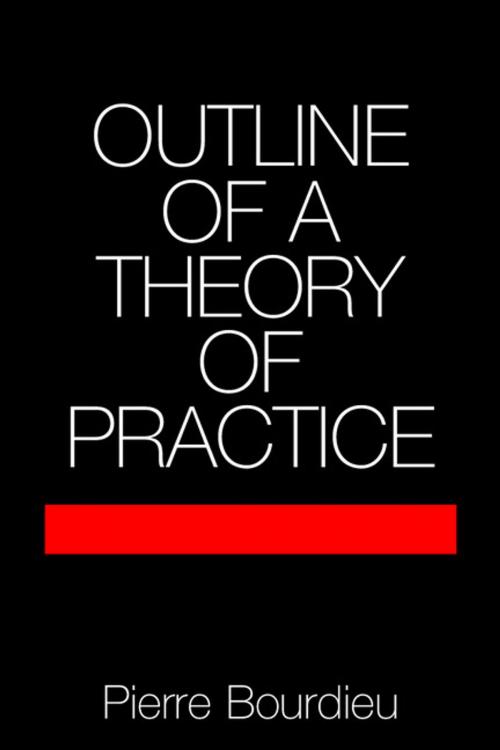Outline of a Theory of Practice
Nonfiction, Social & Cultural Studies, Social Science, Anthropology, Sociology| Author: | Pierre Bourdieu | ISBN: | 9781107263468 |
| Publisher: | Cambridge University Press | Publication: | June 2, 1977 |
| Imprint: | Cambridge University Press | Language: | English |
| Author: | Pierre Bourdieu |
| ISBN: | 9781107263468 |
| Publisher: | Cambridge University Press |
| Publication: | June 2, 1977 |
| Imprint: | Cambridge University Press |
| Language: | English |
Outline of a Theory of Practice is recognized as a major theoretical text on the foundations of anthropology and sociology. Pierre Bourdieu, a distinguished French anthropologist, develops a theory of practice which is simultaneously a critique of the methods and postures of social science and a general account of how human action should be understood. With his central concept of the habitus, the principle which negotiates between objective structures and practices, Bourdieu is able to transcend the dichotomies which have shaped theoretical thinking about the social world. The author draws on his fieldwork in Kabylia (Algeria) to illustrate his theoretical propositions. With detailed study of matrimonial strategies and the role of rite and myth, he analyses the dialectical process of the 'incorporation of structures' and the objectification of habitus, whereby social formations tend to reproduce themselves. A rigorous consistent materialist approach lays the foundations for a theory of symbolic capital and, through analysis of the different modes of domination, a theory of symbolic power.
Outline of a Theory of Practice is recognized as a major theoretical text on the foundations of anthropology and sociology. Pierre Bourdieu, a distinguished French anthropologist, develops a theory of practice which is simultaneously a critique of the methods and postures of social science and a general account of how human action should be understood. With his central concept of the habitus, the principle which negotiates between objective structures and practices, Bourdieu is able to transcend the dichotomies which have shaped theoretical thinking about the social world. The author draws on his fieldwork in Kabylia (Algeria) to illustrate his theoretical propositions. With detailed study of matrimonial strategies and the role of rite and myth, he analyses the dialectical process of the 'incorporation of structures' and the objectification of habitus, whereby social formations tend to reproduce themselves. A rigorous consistent materialist approach lays the foundations for a theory of symbolic capital and, through analysis of the different modes of domination, a theory of symbolic power.















